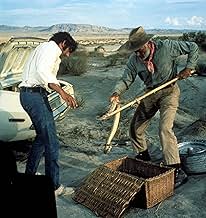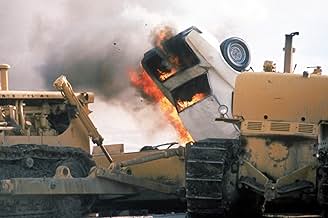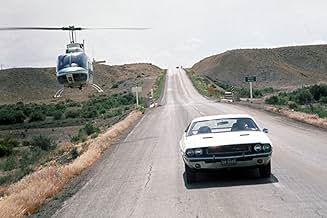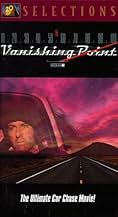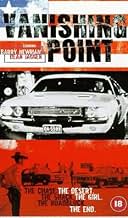During the 1970s, car-delivery driver Kowalski delivers hot rods in record time, but always runs into trouble.During the 1970s, car-delivery driver Kowalski delivers hot rods in record time, but always runs into trouble.During the 1970s, car-delivery driver Kowalski delivers hot rods in record time, but always runs into trouble.
- Director
- Writers
- Stars
- Awards
- 1 nomination total
Charlotte Rampling
- Hitch-Hiker
- (scenes deleted)
Robert Donner
- Deputy Collins
- (as Bob Donner)
- Director
- Writers
- All cast & crew
- Production, box office & more at IMDbPro
Featured reviews
Barry Newman is "Kowalski", an enigmatic figure who has tried everything in his life from stock car racing to the military, and failed at every one of his endeavors. Working as an auto delivery man, he gets an order to transport a 1970 Dodge Challenger R/T to San Francisco, and makes a bet with a few friends that it can be done in an impossibly short time. After loading up on "ups" and throttling the car westward, he is soon pursued vigorously by the police and embraced by the public as something of a hero. During a time when national speed limits were all controversy, this film provides a compelling argument against them: A fast car in the hands of a capable driver is not dangerous. Even the police, so caught up in their own system, don't realize that they are the only ones causing accidents and endangering the public while blindly trying to keep up with and capture Kowalski.
While the film sounds at first to be a simple action film, it's really much more than that. Kowalksi's past is revealed little by little through flashbacks, making the film something of a character study. Kowalski's trip becomes a road trip of existentialism as he runs across various strange characters: Solitary hippies, gay bandits, a boogie-woogie snake handling Christian cult, and the blind soul station DJ (brilliantly played by Cleavon Little) who is attempting to guide him on his journey from within the car's radio.
Topping it off is a great soundtrack, breathtaking cinematography and direction, and automotive action that has seen no equal. This film manages to be both compelling and exciting. Just watch it already.
10/10
While the film sounds at first to be a simple action film, it's really much more than that. Kowalksi's past is revealed little by little through flashbacks, making the film something of a character study. Kowalski's trip becomes a road trip of existentialism as he runs across various strange characters: Solitary hippies, gay bandits, a boogie-woogie snake handling Christian cult, and the blind soul station DJ (brilliantly played by Cleavon Little) who is attempting to guide him on his journey from within the car's radio.
Topping it off is a great soundtrack, breathtaking cinematography and direction, and automotive action that has seen no equal. This film manages to be both compelling and exciting. Just watch it already.
10/10
"Vanishing Point" asks the question and, like other films of this kind before "Smokey & the Bandit" brought the genre to an end, lets us ponder the answer on our own. Other than that, there's no point to this film except to demonstrate that the Challenger is one of the best-looking muscle/sports cars ever made. Get too far into this movie & you'll want to sell your children to have one. Kowalski is a '70s knight-errant, or a Greek mythological hero, just as you please. He rides his Hemi-powered steed on a quest to San Francisco, not for a "what," or a "why," or even for a lady fair, but only for "how fast." Does he seek redemption? Escape? Self-forgiveness? To stick it to the Man? Who cares? Knavish cops close in on him, lotus-eaters like Hovah (Darden) shun him, sirens (especially the stark-naked Texter, who would've stopped Burt Reynolds's Bandit faster than Sally Field ever did) want him to dally. Sharp-featured, Western character actor Anthony James has a hilarious, uncharacteristic turn as a gay hitchhiker. Humble, noble souls come forth to guide Kowalski like angels, including a scruffy snake-hunter (Jagger), chopper jockey & drug dealer Angel (Scott), and the blind deejay Super Soul (Little, who should've been a contender for the part of Howard Beal in "Network"). The Man's attempts to explain Kowalski are annoying distractions, so hit the "mute" button when you see scenes of cops in offices. And stop wondering why Kowalski, on his quest for speed, is always being overtaken & passed by other vehicles. Just put your brain in neutral, put your popcorn where it's handy, and buckle up.
10AdamKey
Richard Sarafian's 1971 film "Vanishing Point" is, for starters, a fascinating study of those persons anthropologists sometimes term "marginal men"--individuals caught between two powerful and competing cultures, sharing some important aspects of both but not a true part of either, and, as such, remain tragically confined to an often-painful existential loneliness. Inhabiting a sort of twilight zone between "here" and "there," a sort of peculiar purgatory, these restless specters cannot find any peace or place, so they instead instinctively press madly on to some obscure and unknown destination, the relentless journey itself being the only reason and justification.
Disc jockey Super Soul (Cleavon Little) and delivery driver Kowalski (Barry Newman) are two of these specters, marginal but decent, intelligent men who can't or won't live in burgeoning competing cultures which in reality have offered them very little of worth or substance, despite their own personal sacrifices. Kowalski himself had tried to "fit in" with the Establishment as a soldier and police officer and later, attempted to do the same with the blossoming 1960s counterculture, but soon disappointingly found that they both were ridden with their own various forms of dishonesty and insincerity. Personal honor, self-reliance and genuine respect--Kowalski's stock in trade--were tragically valued very little by either, despite each one's shrill and haughty claims to the contrary.
Moreover, it's no accident Newman's character has a Polish surname; the Poles throughout their history have created a very rich and unique Slavic culture largely based upon just such a "marginality"--being geographically jammed between powerful historic enemies, Germany and Russia, and never being able to fully identify with either one, at often great cost to themselves. It's also no accident Little's character is blind and black, the only one of his kind in a small, all-Caucasian western desert town--his sightlessness enhancing his persuasiveness and his ability to read Kowalski's mind, the radio microphone his voice, his race being the focus of long simmering and later suddenly explosive disdain--all of the characteristics of a far-seeing prophet unjustly (but typically) dishonored in his own land.
The desert environment also plays a key role in cementing the personal relationship between and respective fates of these two men--to paraphrase British novelist J.G. Ballard, prophets throughout our history have emerged from deserts of some sort since deserts have, in a sense, exhausted their own futures (like Kowalski himself had already done) and thus are free of the concepts of time and existence as we have conventionally known them (as Super Soul instinctively knew, thus creating his own psychic link to the doomed driver.) Everything is somehow possible, and yet, somehow nothing is.
Finally, VP is also a "fin de siecle" story, a unique requiem for a quickly dying age- a now all-but-disappeared one of truly open roads, endless speed for the joy of speed's sake, of big, solid no-nonsense muscle cars, of taking radical chances, of living on the edge in a colorful world of endless possibility, seasoned with a large number and wide variety of all sorts of unusual characters, all of which had long made the USA a wonderful place--and sadly is no longer, having been supplanted by today's swarms of sadistic, military-weaponed cop-thugs, obsessive and intrusive safety freaks, soulless toll plazas, smug yuppie SUV drivers, tedious carbon-copy latte towns, and a childish craving for perfect, high-fuel-efficiency safety and security.
The just-issued DVD contains both the US and UK releases of the film; the UK release, I believe, is a much more satisfying film, as it has the original scenes deleted from the US version. As an aside, Super Soul's radio station call letters, KOW, are in fact the ones for a country & western station in San Diego.
Disc jockey Super Soul (Cleavon Little) and delivery driver Kowalski (Barry Newman) are two of these specters, marginal but decent, intelligent men who can't or won't live in burgeoning competing cultures which in reality have offered them very little of worth or substance, despite their own personal sacrifices. Kowalski himself had tried to "fit in" with the Establishment as a soldier and police officer and later, attempted to do the same with the blossoming 1960s counterculture, but soon disappointingly found that they both were ridden with their own various forms of dishonesty and insincerity. Personal honor, self-reliance and genuine respect--Kowalski's stock in trade--were tragically valued very little by either, despite each one's shrill and haughty claims to the contrary.
Moreover, it's no accident Newman's character has a Polish surname; the Poles throughout their history have created a very rich and unique Slavic culture largely based upon just such a "marginality"--being geographically jammed between powerful historic enemies, Germany and Russia, and never being able to fully identify with either one, at often great cost to themselves. It's also no accident Little's character is blind and black, the only one of his kind in a small, all-Caucasian western desert town--his sightlessness enhancing his persuasiveness and his ability to read Kowalski's mind, the radio microphone his voice, his race being the focus of long simmering and later suddenly explosive disdain--all of the characteristics of a far-seeing prophet unjustly (but typically) dishonored in his own land.
The desert environment also plays a key role in cementing the personal relationship between and respective fates of these two men--to paraphrase British novelist J.G. Ballard, prophets throughout our history have emerged from deserts of some sort since deserts have, in a sense, exhausted their own futures (like Kowalski himself had already done) and thus are free of the concepts of time and existence as we have conventionally known them (as Super Soul instinctively knew, thus creating his own psychic link to the doomed driver.) Everything is somehow possible, and yet, somehow nothing is.
Finally, VP is also a "fin de siecle" story, a unique requiem for a quickly dying age- a now all-but-disappeared one of truly open roads, endless speed for the joy of speed's sake, of big, solid no-nonsense muscle cars, of taking radical chances, of living on the edge in a colorful world of endless possibility, seasoned with a large number and wide variety of all sorts of unusual characters, all of which had long made the USA a wonderful place--and sadly is no longer, having been supplanted by today's swarms of sadistic, military-weaponed cop-thugs, obsessive and intrusive safety freaks, soulless toll plazas, smug yuppie SUV drivers, tedious carbon-copy latte towns, and a childish craving for perfect, high-fuel-efficiency safety and security.
The just-issued DVD contains both the US and UK releases of the film; the UK release, I believe, is a much more satisfying film, as it has the original scenes deleted from the US version. As an aside, Super Soul's radio station call letters, KOW, are in fact the ones for a country & western station in San Diego.
This is the essential 1970s anti-hero movie. It is not supposed to make sense and I have often wondered if it were not meant to be someone's psychedelic dream. Nudity when nudity would not seem to fit; bad cops; beaten people out of sync with plot line. Sounds like a trip. The cast is excellent and this is one of Cleavon Little's last main roles as well as the last main role for the early love interest. John Amos is so underplayed he is almost unrecognizable, I'd love to see his commentary on the movie. And one guy is so ripping off James Dean (though as a racist) that it is unintentionally funny. I'd recommend it as an addition to any American tape library. A true cult classic.
The best road movie ever made. To appreciate it you have got to try and see it from the culture of that era. It is totally anti establishment as was the mood of half of America. So the police are all idiots, the 'good ol boys' are either violent rednecks or passive disapproving onlookers. Kowalski is going to give those mid west conservatives something they won't forget, he's going to shake things up for a day or two. Kowalski is simply the symbol of the many disenfranchised at the time. The story starts at the end. We hear a boring stifling radio news item on the price of grain. We see dreary looking bystanders who need to be turned on. Then Super Soul takes over the airwaves with his wild DJ antics and hippy music trying to jolt these people out of their fixed ways. The old and the new are clashing. This sets the mood we know from then it is rebellious. Other aspects the stunts the music the characters have been well covered below so there is no need to say more on that. Some have said that there is no point to this story or Kowalski's motives and have interpreted the title meaning that. But all a vanishing point is an artist name for the phenomena of perspective where two parallel lines seemingly meet and in the long straight roads of the journey we see plenty of vanishing points.
Did you know
- TriviaIn an interview, actor Paul Koslo spoke about legendary stunt driver Cary Loftin; "One night coming home from location, Cary was driving one of the Challengers back to the hotel, and he passed some New Mexico state troopers going 145 miles an hour! [laughs] He had four or five cop cars behind him with their lights on, but they couldn't catch up because they could only go about 125! So he drove into this little town and started to shut the car down. He pulled into a gas station, and I swear to God, he did a 360 in between the pumps and put the rear of the car - the gas tank - right in front of the super pump! He got out of the car like nothing happened, and the troopers busted his ass right there! [laughs] Oh, you should've seen those cops! They were fuming! They took him in, and the producer had to explain to them that Cary had actually been testing the car - that he did a lot of these spinouts because he'd been having trouble with the car! [laughs] I mean, you do have to test the cars, but you don't do it while you're driving home!"
- GoofsThe 19-inch racks in Super Soul's radio station with large tape reels (in one scene seen fast moving) are not audio equipment. These tape drives were used in computer systems in the 1970s to store data on tape.
- Quotes
Super Soul: This radio station was named Kowalski, in honour of the last American hero to whom speed means freedom of the soul. The question is not when's he gonna stop, but who is gonna stop him.
- Crazy creditsThe Fox logo is shown without the fanfare making it one of the first times this has happened.
- Alternate versionsWhen first released in Brazil, the movie had some scenes cut, reducing the running time to 99 minutes.
- SoundtracksYou Got to Believe
Composed by Delaney Bramlett
Sung by Delaney & Bonnie & Friends
(Courtesy of Atlantic Records)
Details
- Release date
- Country of origin
- Language
- Also known as
- Carrera contra el destino
- Filming locations
- Goldfield Hotel, Goldfield, Nevada, USA(KOW radio station)
- Production company
- See more company credits at IMDbPro
Box office
- Budget
- $1,585,000 (estimated)
- Gross US & Canada
- $12,442,673
- Gross worldwide
- $12,443,722
- Runtime
- 1h 39m(99 min)
- Color
- Aspect ratio
- 1.85 : 1
Contribute to this page
Suggest an edit or add missing content


